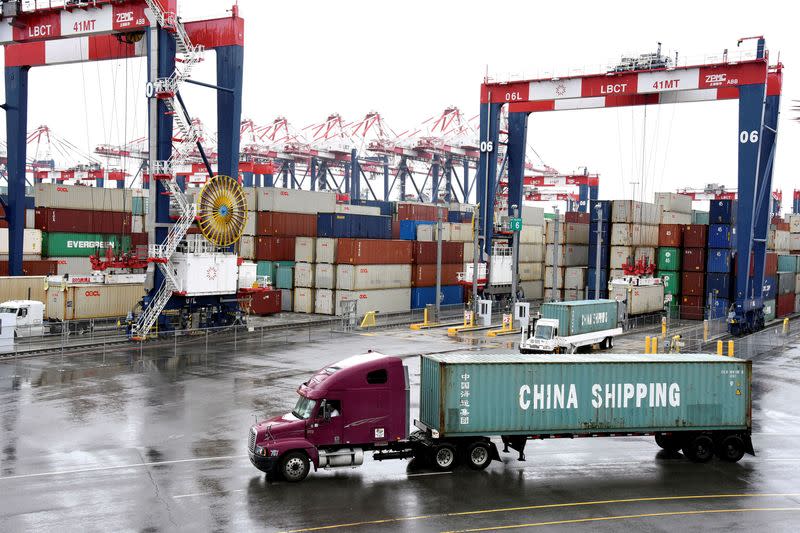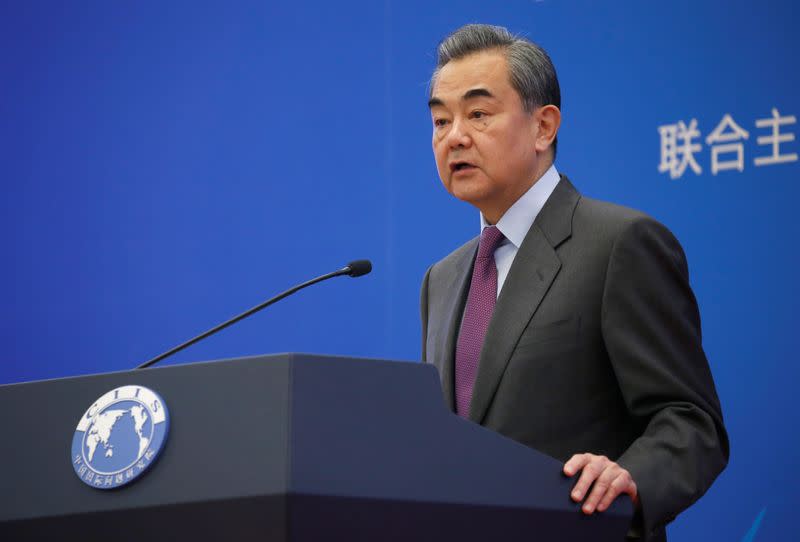U.S. sets China trade deal terms, sources say, but Beijing mum
By Jeff Mason, Andrea Shalal, David Lawder and Se Young Lee
WASHINGTON/BEIJING (Reuters) - Washington has set its terms for a trade deal with China, offering to suspend some tariffs on Chinese goods and cut others in exchange for Beijing's buying more American farm goods, U.S. sources said on Thursday.
Beijing has yet to confirm whether it is on board with the proposal, although officials will hold a press briefing Friday night local time to update progress on the talks, the State Council Information Office said. Officials from the state planner, ministry of finance, foreign ministry, agriculture ministry and ministry of commerce will attend.
In the hours since U.S. sources said terms for a phase-one deal were in place, Beijing's silence had raised questions over whether the two sides can agree a truce in their trade war before a new round of tit-for-tat tariffs takes effect on Sunday.
A source briefed on the status of bilateral negotiations said the United States would suspend tariffs on $160 billion in Chinese goods expected to go into effect on Sunday and roll back existing tariffs.
In return, Beijing would agree to buy $50 billion in U.S. agricultural goods in 2020, double what it bought in 2017, before the trade conflict began, two U.S.-based sources briefed on the talks said.
China's yuan jumped to a four-and-a-half-month high against the U.S. dollar and Chinese shares rallied on Friday on hopes the two sides will avoid further escalation of the trade war. U.S. equity index futures whipsawed on Friday morning as investors fretted over the lack of official confirmation.
Neither Washington nor Beijing made official statements about a deal, however, raising questions about whether the terms had been agreed by both sides.
New Chinese tariffs on U.S. goods are due to take effect at 0401 GMT Sunday and new U.S. tariffs on Chinese goods will apply at 0501 GMT. Both would need to make formal announcements to postpone or cancel the tariffs.
Washington had offered to cut existing tariffs on Chinese goods by as much as 50% and suspend the new tariffs scheduled for Sunday to secure phase one of deal first promised in October, two people familiar with the negotiations had said earlier on Thursday.
One of those people told Reuters that U.S. President Donald Trump and his top advisers agreed on the terms for a proposal, possibly a final offer, and were now waiting for Beijing to sign off in writing.
A Beijing-based U.S. business community official also told Reuters he viewed the reported deal more as a "final offer" that has been approved by Trump but not yet affirmed by Beijing.
Chinese foreign ministry spokeswoman Hua Chunying, asked about the status of the trade talks during a daily briefing on Friday, did not comment on whether an agreement has been reached or specific terms of any deal with the United Sates.
"China is committed to constructive dialogue to resolve and manage our differences, and believe ... the deal must be mutually beneficial," she said.
Some analysts doubted China could deliver such a dramatic increase in agricultural purchases. For instance, demand for soybeans - a key U.S. product used for animal feed - is down after African swine fever devastated China's pig herd. It also made a big increase in corn purchases unlikely, they said.
Ramping up purchases of other U.S. farm products such as beef would be hard, too, they said.
"There's just no logistical way that they can double imports in a year," said Darin Friedrichs, senior Asia commodity analyst at INTL FCStone.
LOOMING DEADLINE
Senior Chinese diplomat Wang Yi blasted Washington for damaging relations by criticizing Beijing over issues such as Hong Kong and the treatment of Muslim Uighurs. He did not mention the trade war.
"We will never accept the so-called unilateral sanctions and any acts of bullying," he during an event on Friday morning.
In the absence of a deal that at the least declares a truce in the 17-month trade war, U.S. tariffs on Chinese imports, including products such as video game consoles and computer monitors, begin Sunday. China's retaliatory tariffs, targeting goods ranging from corn and wheat to small aircraft and rare earth magnets, will also take effect.
Beijing is also scheduled to begin reapplying on Dec. 15 an additional 25% tariff on U.S.-made vehicles and 5% tariffs on auto parts that had been suspended at the beginning of 2019.
Chinese officials and trade experts have warned that another exchange of tariffs could torpedo the trade negotiations and further escalate the dispute. Some experts say it's possible that talks may be suspended altogether until after the U.S. presidential election in November 2020.
(Reporting by Jeff Mason, Andrea Shalal, David Lawder in Washington; Cate Cadell, Dominique Patton and Tony Munroe in Beijing; Winni Zhou and Andrew Galbraith in Shanghai; writing by Heather Timmons and Se Young Lee; editing by Matthew Lewis, Sonya Hepinstall, Sam Holmes, Lincoln Feast, Gerry Doyle and Larry King.)

 Yahoo Finance
Yahoo Finance 


